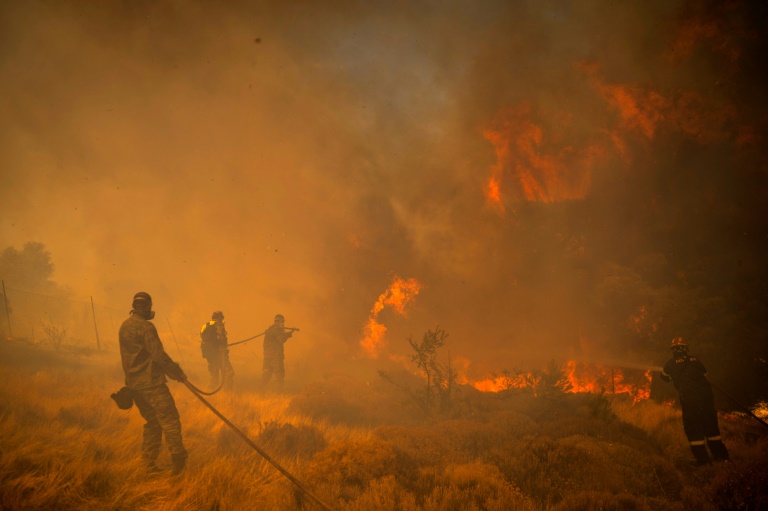As devastating wildfires ravage Greece, experts say the blazes cast a harsh light on the failure to prepare against and contain them, threatening irreversible damage to the country’s rich biodiversity.
Climate scientists warn extreme weather and fierce fires will become increasingly common due to man-made global warming, heightening the need to invest in teams, equipment and policy to battle the flames.
But “Greece has always struggled to protect its rich ecosystem,” Takis Grigoriou, who heads the climate change department for Greenpeace Greece, told AFP.
Greece — along with Turkey, Italy, Spain and Algeria — has been hit by a savage fire season that Prime Minister Kyriakos Mitsotakis described as an “ecological disaster”.
Authorities were taken by surprise at the end of July, as hundreds of fires began around Athens, but also on the islands Evia and Rhodes and in the Peloponnese peninsula.
Critics say poor infrastructure, weak policy and a lack of respect for nature are all at least partly to blame for the failure to contain the blazes in Greece.
As a result, precious ecosystems will pay the price, and human lives are at risk.
– Failing prevention policy –
In two weeks, more than 100,000 hectares of land went up in smoke, eating up buildings, pine forests, olive groves, beehives and livestock and forcing dozens to flee from their homes.
The European Forest Fire Information System said it is the biggest loss of land since 2007.
On Tuesday, over 400 Greek and Polish firefighters were battling a massive fire on a mountain near Vilia, about 60 kilometres (40 miles) northwest of Athens for a second day.
Sweltering heatwaves such as the ones blanketing southern Europe increase the flammability of forests.
But Efthymis Lekkas, Athens University professor of natural disaster management, said Greece’s failing operational and prevention systems are also to blame.
“Firebreak roads in forests weren’t prioritised by the different Greek governments because they didn’t have a direct political impact,” he said, estimating the long-term impacts of the fires at around five billion euros ($5.9 billion).
And illegal buildings, a lack of forest mapping and poor respect for nature are all part of a failing fire prevention policy, Grigoriou from Greenpeace said.
Locals met by AFP denounced the firefighters’ lack of equipment to battle the huge blazes, which paled in comparison to the means of the firefighters from twenty other countries that came to lend a hand.
One resident, who could only watch helplessly as her village in the north of Evia island was circled by flames, told local reporters that allowing the fires to get so close to homes was a crime.
– Unique species –
Authorities organised mass evacuations to avoid deaths, with the memory of the loss of 102 lives in fires in July 2018 and 77 lives in 2007 still sore. This year, three deaths have been recorded so far.
Beyond the loss of human life, such huge wildfires will cause immense and long-lasting biodiversity loss, says Diana Bell from British University of East Anglia’s School of Biological Sciences.
“Greece is home to more than 6,000 different species of plants and trees,” with some of them “not found anywhere else in the world”, Bell told AFP.
And when locals flee their homes as their properties are engulfed in flames, more rural areas are abandoned — increasing their flammability, she added.
Athens has linked the wildfires to climate change, but environmental groups have accused the government of using rising temperatures as an excuse to cover up the lack of means and prevention policies.
The country has ignored policy proposals from the World Wildlife Fund for 20 years, said the head of the group’s Greek chapter, Demetres Karavellas.
“The climate crisis is not an excuse to fail but must be taken as an alarm to instigate change,” he said.









